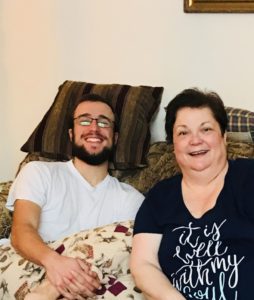Until I heard the song”Crucify Him” by Shane & Shane, all I thought of Palm Sunday services was that it was that super long, boring Mass with the Passion reading. Everyone’s favorite, right?
The verses in the song call out the irony that in under a week, the people in Jerusalem can go from shouting “Hosanna!” (which translates to “Save us, please!”) to “Crucify Him!”
“I sing, ‘Hosanna!’ when I want it all / Then I crucify the Son of God / ‘Cause He isn’t who I always thought / Not what I want, but what I needed / I sing, ‘How great and mighty is the King!” / Just as long as He considers me / High above every other thing / Even His glory”
Ouch. How many times have I treated Jesus like someone who had to be what I wanted (like the “nice” God who always loves me and puts rainbows in the sky) while I disregarded the fact that He is also what I NEED (like a God whose teachings hold me to a higher, more difficult to follow, moral standard). How many times have I talked to others about God, or shown up at Church, putting up a front, while actually pretending that my own prayer life is often more of an uphill climb than an easy walk?
“Broken like a record / spinning round and round like a hurricane / I pour out water then I disappear / Reappearing when I fear enough / Or need a touch from You / I sing, ‘Hosanna!’ once again / Then I say, “Crucify Him!”
How many times have I only turned to God when I WANTED to, and not when I NEEDED to? Have I ever felt like I should try to block God out of my life when I know that he wouldn’t be happy with how I treated someone, failed to do the right thing, or was just settling for apathy?
“It’s packaged differently than Pharisees / wrapped in sing-alongs and Christianese / Empty hallelujahs to the King / When my heart is loving idols / A man of sorrows acquainted with grief / He had no form; He had no majesty / How could he have the audacity / To ask me to give Him my tomorrow?”
What do I make a priority, or an “idol,” over my relationship with God? When have I thought that I could radically give God some aspect, or all, of my life, and then chosen to rely on my own understanding and desires?
The beautiful part about the Passion story is that in the end, despite God having every possible reason to abandon us and change his plans to redeem us, he doesn’t. The crucifixion is the summit of God showing us how much he loves us from the very beginning of human history.
I think of Genesis 1:26, where God says, “Let US make man in OUR image,” using the plural to show that each Person of the Trinity has always existed – that from before the Fall and Original Sin, Jesus, our Redeemer, existed. I think of Ezekiel, who, after God’s presence left the Temple through the East gate because of people’s corruption, prophesied that the Lord would return from the East (like the road Jesus uses to enter Jerusalem), and take possession of the Temple and rebuild it (like how Jesus drove out money changers). In Zechariah 9:9, we see the prophecy that the Davidic king (whose line is continued down to Joseph, the adoptive father of Jesus) would return to Jerusalem riding on a donkey. Sections of Isaiah, and Psalm 22, speak about exactly how the Messiah would die, hundreds of years before the Romans invented crucifixion as a method of torture. “They have pierced my hands and my feet… They stare at me and gloat, they divide my garments among them, for my clothing they cast lots.” (Ps. 22)
The 300 insanely specific Old Testament prophecies that Jesus fulfills throughout his time on earth point directly to why He comes incarnate – to save us. To save YOU. Even though over thousand and thousands of years, humanity has continually failed God. God’s people have turned to idols, turned a blind eye to miracles and signs, shut their ears to words of the prophets, and sinned over, and over again. And yet He STILL loves us enough to suffer more than we can imagine, and die on the cross for us.
As we wrap up this Lenten Reflection series, I encourage you to enter into Holy Week with that personal, intimate, love of God in mind. Today’s second reading says it best: “ that at the name of Jesus, every knee should bend, of those in heaven and on earth and under the earth, and every tongue confess that Jesus Christ is Love, to the glory of God the Father” (Phil 2:6-11).



